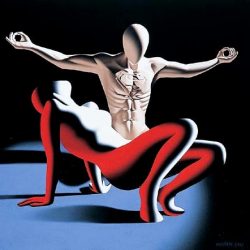You’ve been led to believe that sex is all about your penis right? Not necessarily – of course your penis is involved, but how well do you understand and feel your:
- Body
- Energy
- Arousal
- Ejaculation
Exploring your body to understand basic facts about your sexual anatomy and your arousal levels is the first step to understanding how to experience pleasure, past your genitals.
Some men masturbate with pornography and, while I won’t discuss the pros and cons of that here, it’s important to mention that pornography takes you away from yourself.
Pornography can distract you from feeling your body’s sensations as you are getting ready to ejaculate.
Most men think when they orgasm they ejaculate. What most men don’t realize is, ejaculation is only one form of an orgasm.
Becoming familiar with your sexual arousal patterns allows you to recognize how you feel as you get to the ‘point of no return’- the moment when ejaculation feels unavoidable.
Some experts advise to think about sports or something else, but contrary to popular belief and practice, distracting yourself and thinking about sports during sex often times do not work.
The distraction can only tune you out of your body disconnecting you from the experience.
Why disconnect from the experience, instead tune in to your body and enjoy the full experience.
The point of tuning into your body is to become familiar with all of the sensations and how your body feels as you approach the point of ejaculation.
Do you know what happens to your body’s response and your thoughts during the peak of arousal and just before climax?
In the 1960’s, Masters and Johnson identified the four-phases of Sexual Response Cycle as a way to describe the body’s physical changes during lovemaking.
Here are the four phases of the Sexual Response Cycle:
1.Excitement
- The beginning of arousal.
- When you start to get sexually aroused, your penis increases in length and width as its spongy tissue fills with blood.
- Erection starts to build.
- Heart rate increases.
- Breathing deepens if you allow it.
- Nipples become more sensitive.
2. Plateau
- Complete Arousal.
- Erection becomes fuller and firmer.
- As you become erect, the valves close down in the veins, stopping the blood from returning to the body.
- The scrotum clinches the body.
- Pre-cum drips to moisten the head of the penis.
- As ejaculation approaches, your excitement intensifies and breathing quickens until you reach your point of no return.
3. Ejaculation
- The release of semen happens in two parts.
- As excitement peaks, the prostate gland and seminal vesicles empties the secretions into the urethra.
- The secretions combine with sperm to form semen. Ejaculation follows seconds later and wavelike contractions of the pelvic muscles push the semen out of the penis.
- During ejaculation the muscles around the anus also contract.
4. Resolution
- Heart rate returns to normal.
- Rapid breathing changes to normal.
- The penis becomes soft.
- The scrotum descends.
The term sexual response is a medical term explaining how things happen during sex. It refers to the more automatic things that happen to your body during sex.
The term is a way of explaining and measuring how your body responds to sexual stimulation.
While this concept may be a great way to explain the different cycles, it doesn’t always apply to everyone or every situation.
When trying to figure out a specific sexual difficulty or dissatisfaction we have to dig a little deeper.
At times human sexuality can be a bit complicated, because of the physical, psychological, emotional, and spiritual components involved.
The Sexual Response Cycle can be a useful tool to start looking at what’s happening to your sexual body on a physical level and can help you get a better idea of exactly when things are becoming problematic.
Personal growth and changes often don’t happen overnight or without awareness and conscious thoughts.
It’s important to note if you don’t fall under what is considered to be ‘normal’ it doesn’t mean there is something wrong with you.
More often than not, it’s just a reminder of how truly unique sexual response is for each of us.


























Follow US